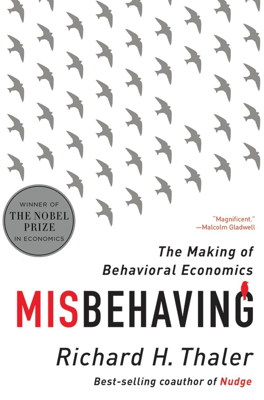Summary
Key Insights from "Misbehaving" by Richard H. Thaler
Misbehaving delves into the intricacies of behavioral economics, a domain pioneered by Richard H. Thaler, contrasting significantly with traditional economics which assumes rational decision-making in humans, referred to as homo economicus. Thaler's experiences and observations, notably his early academic challenges, laid the foundation for questioning traditional economic assumptions, particularly the rationality of human decisions and the efficiency of markets without considering human psychological elements.
Core Concepts and Theories
- Endowment Effect: Thaler introduces the concept where individuals ascribe higher value to things simply because they own them, significantly affecting economic decisions and market behaviors.
- Prospect Theory: Developed by Kahneman and Tversky, and a cornerstone of Thaler's discussions, it addresses the real patterns of decision-making under risk, differentiating sharply from the utility theory. It’s detailed with phenomena like loss aversion where losses impact individuals disproportionately compared to gains.
- Sunk Cost Fallacy: Described as a deviation from the economically rational behavior, wherein individuals continue investing in a losing proposition due to the magnitude of prior investments, ignoring rational cues to withdraw.
Behavioral Economics in Application
Thaler not only describes theoretical constructs but also places a strong emphasis on real-world applications: - Policies and Business Practices: Insights from behavioral economics have led to innovative policy-making, notably in the UK through the Behavioural Insights Team which integrates behavioral science into government operations. - NFL Draft and Financial Markets: Thaler applies behavioral concepts to explain phenomena in sports and finance, such as the inefficiencies in NFL draft decision-making and market anomalies like the closed-end fund puzzle.
Challenges and Academic Journey
Misbehaving also traces Thaler's academic journey, highlighting his confrontations with traditional economists who were skeptical of integrating psychology with economics. Despite resistance, his persistence led to significant contributions to economics, influencing policy-making, academic perspectives, and business strategies.
Evolution and Impact of the Field
The field of behavioral economics has matured, moving from fringe observations about human irrationality to a robust field that challenges and enriches traditional economic theories by factoring in real human behavior. Thaler's work has notably led to more dynamic economic models, reshaped policy-making, and informed effective business strategies across the globe.
One of the profound implications of Thaler's insights is encouraging economics to embrace a more nuanced, realistic view of human behaviors, acknowledging biases and decision-making anomalies as integral to understanding economic phenomena, not merely deviations from the norm. This approach has shifted how economic theories and models are crafted, ensuring they are not only theoretically sound but also practically viable and reflective of reality.
Per-chapter summary
- Supposedly Irrelevant Factors
- The Endowment Effect
- The List
- Value Theory
- California Dreamin’
- The Gauntlet
- Bargains and Rip-Offs
- Sunk Costs
- Buckets and Budgets
- At the Poker Table
- Willpower? No Problem
- The Planner and the Doer
- Misbehaving in the Real World
- What Seems Fair?
- Fairness Games
- Mugs
- The Debate Begins
- Anomalies
- Forming a Team
- Narrow Framing on the Upper East Side
- The Beauty Contest
- Does the Stock Market Overreact?
- The Reaction to Overreaction
- The Price Is Not Right
- The Battle of Closed-End Funds
- Fruit Flies, Icebergs, and Negative Stock Prices
- Law Schooling
- The Offices
- Football
- Game Shows
- Save More Tomorrow
- Going Public
- Nudging in the U.K.
